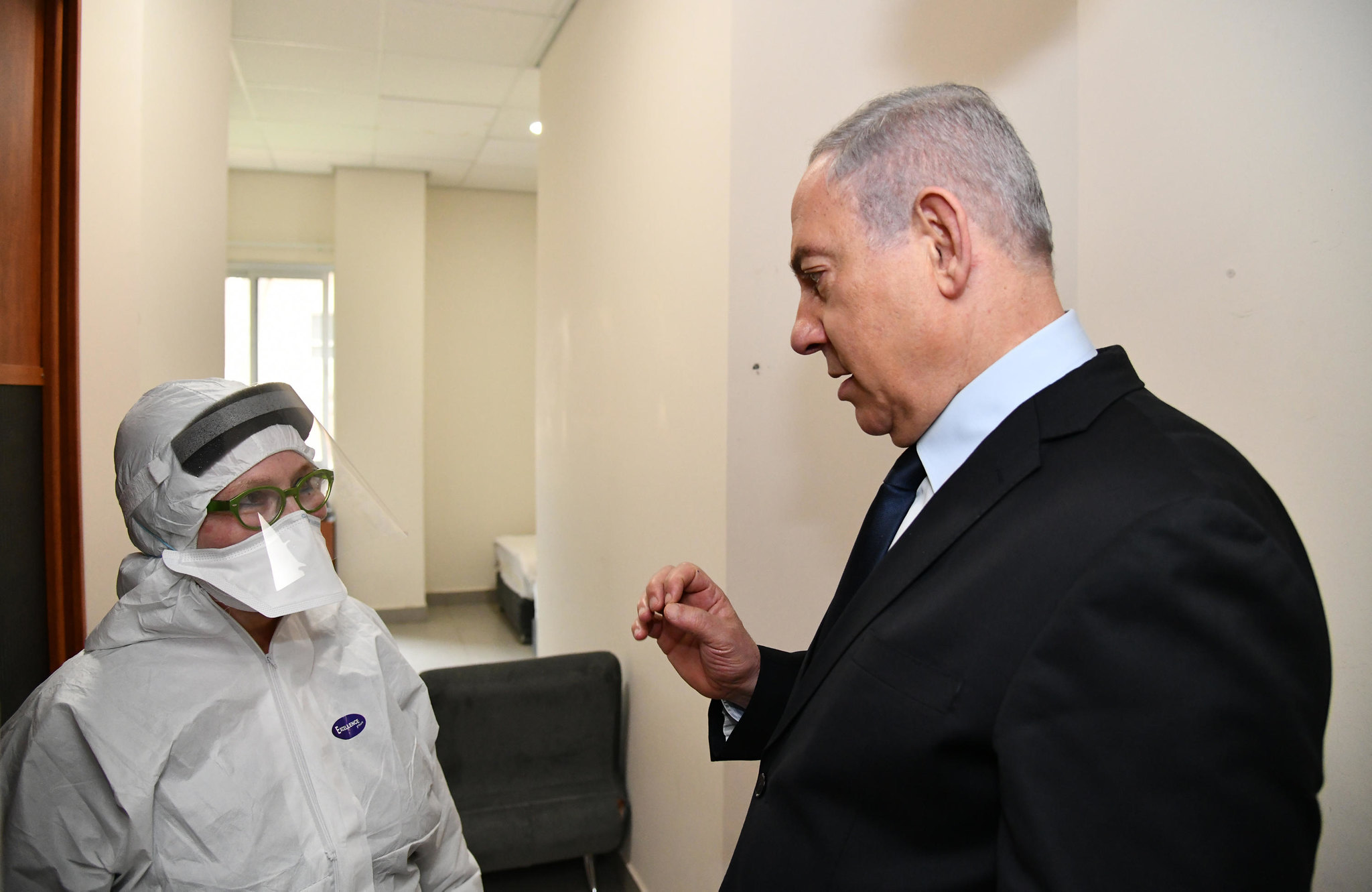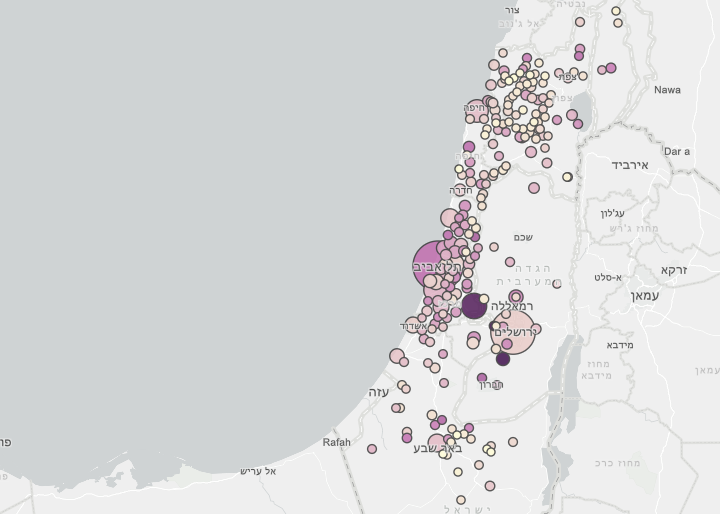Publications
INSS Insight No. 1283, March 31, 2020

The number of people in Israel infected with the coronavirus continues to rise, a large part of the economy is shut down, and the state is edging closer to a full lockdown. This article compares the strategy adopted by the Israeli government with an alternative strategy proposed by critics. Above all, the political echelon, which demands from the people sacrifice at times of crisis and war, must rise above political disputes and unite to enable Israel to handle the crisis in the best way possible. In this context, it is necessary to manage the crisis through the cabinet, and as soon as possible approve an emergency budget, which will include measures to enhance public stamina and societal resilience. In addition, there should be a skilled staff for disseminating information; overly-frequent announcements of policy changes should be avoided; and the imperative rigorous debate of the State Comptroller’s report on the dismal state of the health care system should be postponed until after the crisis is over.
The coronavirus pandemic has fostered a crisis, both national and global. The crisis has implications for the physical security of the public, and the measures taken in response have implications for the economic security and civil liberties of the population. In the public debate in Israel and around the world, two main strategies to confront the crisis are evident: “social distancing” and “acceptance,” in other words, coming to terms with it.
Social distancing involves steps to separate between people in accordance with the severity of the situation, ranging from isolation of patients to restrictions on proximity between people to closing the education system and parts of the economy to a complete lock-down. The aim is to isolate the virus, which is unable to survive for a long time outside of a human host, and curtail its ability to settle in another human host. It is designed to curb the epidemic, or at least slow its spread. The state aims to treat patients and gain time to enable the health system to prepare for mass illness (adding tests, beds, and respirators), and to find treatments for the disease and develop a vaccine against the virus. This strategy involves many tests and a controlled exit from the crisis, with at-risk populations the last to be released from the restrictions.
China was the first to implement this strategy, and has so far been successful; many other countries, including Israel, are trying to follow this course. Israel’s decision making on increasing the scale of social distancing is reportedly based on a mathematical model that relies on clinical assumptions. The model includes four scenarios differentiated by the rate of infection in the event that social distancing measures are not taken. The worst case scenario assumes that each carrier infects two other people, while the best case scenario assumes that each carrier infects 1.2 other people. The mortality rate in the best case scenario is far lower, but the length of the epidemic will be longer. The aim of the strategy is to reduce the infection rate to under 1 person per carrier, so that the pandemic is obstructed quickly and the number of deaths is as low as possible.
The number of carriers of the virus is far greater than what Is known to the health systems. Thus, it is of critical importance to identify precisely who is infected. Testing and mobile phone pinpointing are important both to focus treatment and as an intelligence tool to manage the crisis, along with measured decisions on social distancing steps, the rising economic cost notwithstanding. The rate of tests carried out in Israel is over 5000 per day and the goal is much higher. On this point, Israel is trying to implement positive lessons from other countries, in particular Singapore, Taiwan, Hong Kong, South Korea, and Iceland.

The main difficulty with this strategy is that social distancing measures intensify economic and social crises. In Israel, more than 900,000 people have joined the ranks of the unemployed. Israel is now not far from a complete lockdown. A large part of the economy is shut down and people are permitted to go out only for essential work, and to buy groceries and medicines. The situation in Israel is similar to that in Germany, but better than in Italy and Spain, which are both very close to a full lockdown. The economic crisis is tougher for countries whose economies are highly dependent on the global economy, including Israel, because they are highly exposed and sensitive to the consequences of the pandemic for the global economy. For example, Israeli exports accounted for 29 percent of GDP in 2019, and much of Israel's research and development (R&D) capital comes from foreign investments. The state of the global economy in the future will also have an impact on when the economic crisis in Israel ends.
The big inherent risk in this strategy is that weak links in the economy and a large part of the public will find it hard to survive the crisis long before the virus has been brought under control. In order to manage this risk, every intensification of social distancing requires government assistance. Indeed, many governments around the world are providing aid and stimulus packages to businesses and employees, and central banks are acting to improve liquidity on the capital markets.
"Acceptance," or coming to terms, is urged by those who believe that social distancing should not be employed much more than what occurs in a severe flu outbreak. Some believe that the public will in any case be infected and that the best approach is to deal with it as quickly as possible. Presumably those who recover from the illness will be immune to it (natural immunity), and thus the number of those immune rises with the number of infections. Britain initially adopted this strategy, but changed course on March 17. Among the strategy’s proponents in Israel are opponents of the Health Ministry’s policy, including well-known medical experts and economists. In their view, Israel’s measures have been too extreme; this has been their opinion since the government banned incoming flights to Israel and imposed a quarantine period on persons returning from overseas. Recently some have called for reconsidering this strategy, to the exclusion of the elderly and other at-risk populations.
The main shortcoming of this strategy, at least when the pandemic is out of control and the health system has yet to attain an adequate level of preparedness, is that it will lead to the collapse of the health care system and harm medical teams, as in Italy. Furthermore, the strategy cannot really be enforced ꟷ in a situation of mass infection, independent of government guidelines, the public itself will likely shut down the economy. Furthermore, adopting this strategy will reduce the ability to use trial and error and to isolate procedures, while subsequent adoption of the social distancing strategy will be more difficult.
Conclusion
It appears that so far Israel has chosen the right strategy and has even been a few steps ahead of some Western countries that have also adopted it. However, Israel entered the crisis with a very poor physical health care infrastructure and lagged on issues of testing, and will need to compensate for this.
Recommendations:
- Manage the crisis systemically via the cabinet. It is imperative that the Knesset approve an interim budget so that resources are allocated for management of the crisis.
- Establish an information bureau, while avoiding overly-frequent announcements to the public of policy changes; postpone rigorous debate of the State Comptroller’s report until after the crisis is over.
- Manage risk methodically at all stages. For example, price all measures on the social distancing scale and examine the cost vs. expected benefit. Give priority to measures with high strategic value and limited costs such as increasing the number of tests (to tens of thousands per day) and adopt rapid testing as soon as possible.
- Conduct a review. In recent weeks it seems that medical considerations have dictated the response to the crisis almost unchallenged and without sufficient checks and balances. The Health Ministry’s mathematical model must be tested and reviewed, and alternative models built. An integrated model that makes an adjusted calculation that includes the economic and social damages of social distancing measures should also be built.
- Conduct research and debriefing on an ongoing basis to improve management of the crisis and find an exit strategy, but postpone debate and criticism of the health care system. Support relevant R&D and strategic research that may ease management of the crisis. Set up an ad-hoc intelligence center to coordinate all information and knowledge for state entities. Conduct rapid comparative studies on the situation and on strategies adopted in certain countries.
- Divert medical teams from other fields and train them to treat coronavirus (even via the reserve military system). Protect key personnel in the economy from infection and appoint a number 2 and a number 3 for each manager. Protect medical staff even outside of their hospital work hours.
- Construct a plan to involve the IDF in the crisis that on the one hand takes into account its excellent logistical capabilities and on the other seeks to prevent infections within the army. Even though there is a sense that the security threat has declined, the security apparatus must assume that Israel is not necessarily on a strategic hiatus vis-à-vis its enemies.
- Support the ability of the public to establish work stations at home that will enable remote work, study, and social connections. This should be achieved in part by reducing VAT on equipment and software, and recruiting professionals to assist the elderly population.
- Set up an exemptions committee that will enable the operation of productive factories and create conditions for workers to return to the economy with protective equipment.
- Introduce stiffer sanctions for persons disseminating fake news and aggressively enforce price supervision for goods whose cost has been raised under the auspices of the crisis. Warn suppliers against using the situation to raise prices, and warn employers against using the crisis to lay off employees without justification.
- Accelerate global cooperation between countries, in particular in the knowledge field and with regard to lessons learned and means relating to the crisis. Also, coordinate trade during and upon exit from the crisis.
- Improve social stamina. For example, increase aid packages for businesses, employees, and private citizens, while adopting measures taken in other countries such as postponing mortgage payments, and perhaps even providing rent assistance for weaker families.
- Determine additional tax brackets and raise the ceiling on national insurance payments for those with high salaries.
- Maintain a controlled depreciation of the shekel to improve the competitiveness of exports and not lose market share overseas. Reduce the interest rate.
- The National Security Council and government ministries should prepare a plan for when the health crisis begins to diminish, and immediate steps to maintain capacities should be derived from that plan.


